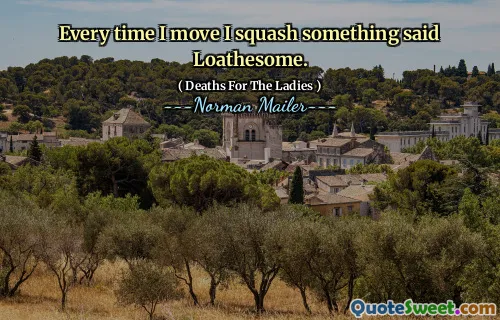I won't stay inwith married menany moresaid the wise girlthey're too agreeable,it's a little too muchlike curlingupwith the good book.You meanagood bookOh, dear,did I saythegood booksighed the witch.
In Norman Mailer's "Deaths For The Ladies," a wise girl expresses her decision to avoid relationships with married men, noting that they can be charming and agreeable, akin to the comfort of curling up with a good book. This metaphor highlights the allure and ease of such connections but also implies a deeper issue of complicity in their infidelity. The exchange continues with a playful banter where 'the good book' becomes a point of confusion, suggesting that even though these relationships seem enticing, there are moral implications to consider. The witch’s sigh indicates a recognition of the complexity involved in relationships that appear simple on the surface.
In Norman Mailer's "Deaths For The Ladies," a wise girl expresses her decision to avoid relationships with married men, noting that they can be charming and agreeable, akin to the comfort of curling up with a good book. This metaphor highlights the allure and ease of such connections but also implies a deeper issue of complicity in their infidelity.
The exchange continues with a playful banter where 'the good book' becomes a point of confusion, suggesting that even though these relationships seem enticing, there are moral implications to consider. The witch’s sigh indicates a recognition of the complexity involved in relationships that appear simple on the surface.

